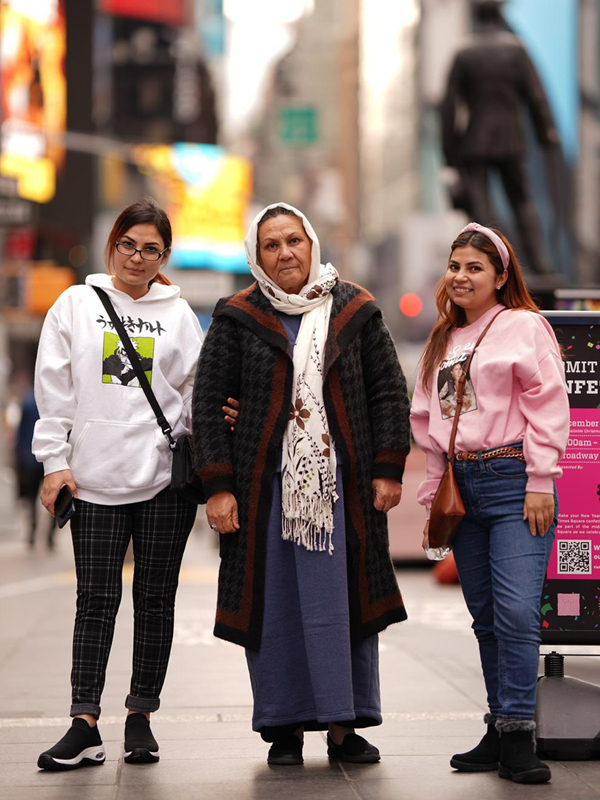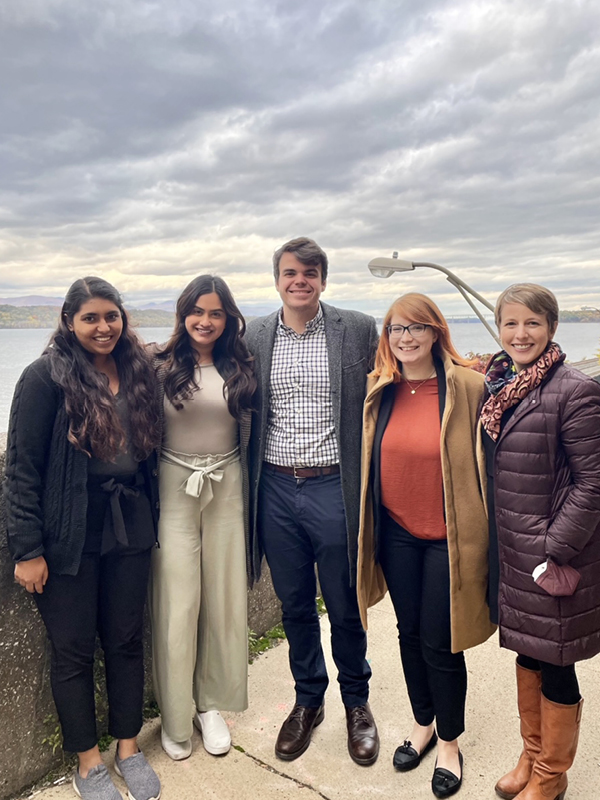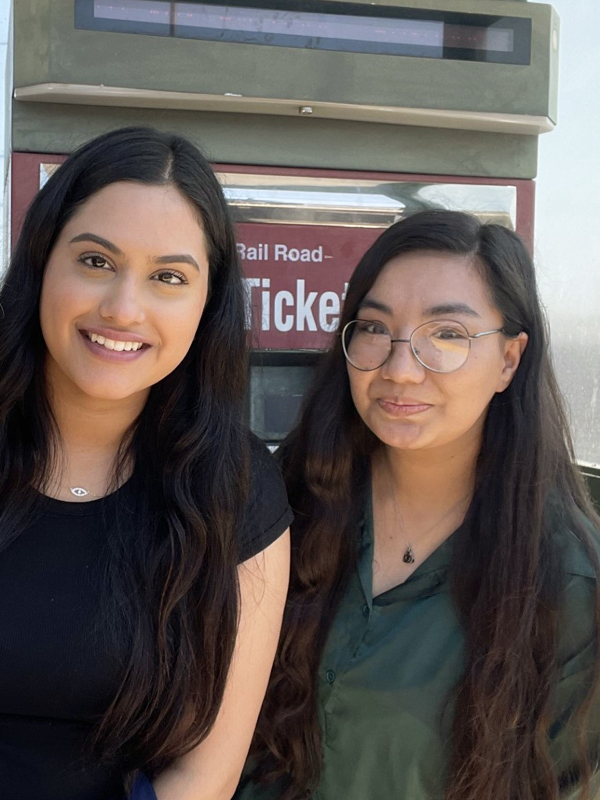“My shoulders feel light now”: NYLS Clinic Celebrates Asylum Grants for 6 Afghans
By Professor Claire R. Thomas ’11
After the U.S.-backed Afghan government and military fell to the Taliban in August 2021, the United States and coalition partners airlifted over 100,000 vulnerable Afghans out of Kabul. President Biden directed the U.S. Department of Homeland Security to create Operation Allies Welcome to allow some Afghan nationals to enter the United States with humanitarian parole, after undergoing a comprehensive screening and vetting process. During the 2022–23 academic year, NYLS Asylum Clinic students worked with six Afghan women who escaped Kabul though the large-scale evacuations. These women all spent time on U.S. military bases throughout the country before resettling in New York. Their entries with humanitarian parole allowed them to legally work in the United States and to receive certain benefits but did not put them on a path towards obtaining a “green card” or future U.S. citizenship. As a result, the clinic represented these six Afghan women in their U.S. asylum applications.
Working With the Nasiri Family
Ms. Anisa Nasiri and two of her daughters, Bahar and Nabila, were resettled in Albany, New York after escaping from Afghanistan, where they were religious and ethnic minorities. Nasiri is a disabled widow living with multiple serious medical conditions who remembered what Afghanistan was like when the Taliban were in power in the 1990s and did not want Bahar or Nabila to live under their control.
Nasiri said, “I have a lot of daughters. This is challenging in Afghanistan, to have so many daughters. This creates lots of problems. Daughters cannot go outside by themselves; they could not study when the Taliban are in charge. I wanted all of my children to go to school. I couldn’t go to school, and I wanted them to have the opportunities that I couldn’t have.”
In Afghanistan, Bahar completed her university education and had just begun to work as a prosecutor when she was forced to evacuate. Bahar describes her life in Afghanistan, “I couldn’t be free as a woman or girl. I felt like there were walls built all around me. There is discrimination everywhere. You have to fight for your rights all the time. It is exhausting.”
Both Bahar and her younger sister, Nabila, who was a journalist in Afghanistan, are now working in Albany and studying at SUNY Schenectady to improve their English.
Clinic students Gabrielle Schwartz Prusnofsky ’24 and Molly Dowd ’24 worked with the Nasiri family during the 2022–23 academic year. Their reflections are below.
Gabrielle Schwartz Prusnofsky ’ 24
“Hearing their firsthand accounts of life under the Taliban as women was an experience I will never forget. These women told us about how their lives had changed so quickly and to hear their story of strength and perseverance was so rewarding.
I learned a lot about myself as a human being and as an immigration law advocate. I learned the importance of empathy and a lot about my own understanding and assumptions of Afghan culture. This was my first experience working directly with someone of a fundamentally different culture, and it taught me a lot.
In the end, all these women wanted was to live in a country where they could be safe from harm and live their lives.”
Molly Dowd ’24
“All of the clients I worked with were so strong and have suffered more than I can imagine. Talking with the women and listening to normal parts of their life and how they were considered second class to men in society was very eye-opening. I strongly regard myself as a feminist and am vocal about the issues facing women in America, and theoretically, I know that women in other parts of the world are just like me—they wanted to go to college and work in a job they dreamed of since they were a little girl, but they were not able to. They risked their lives to teach or just to exist. When asking them about harassment they may have faced, hearing men say awful things to them as they walked down the road was normal for them. These women inspired me with their ability to be strong in the face of systemic discrimination; their ability to leave their home and seek asylum in a foreign country took incredible strength.
When asked what they wanted the world to know about Afghan women, sisters Bahar and Nabila shared their thoughts.
Bahar Naim Naseri
“Afghan women are resilient, courageous, and full of untapped potential. We have dreams, aspirations, and talents just like women everywhere. Our voices matter, and we deserve to be heard, respected, and supported in our pursuit of equality and opportunity.”
Nabila Naim Naseri
“Here is what I want the world to know about Afghan women:
- We are strong, brave, and determined.
- We are more than victims of war and oppression. We are survivors and changemakers.
- We face enormous challenges, but we are not defined by our struggles. We are defined by our strength and resilience.
- We want to be seen, heard, and valued in society and the world as equals.
- We want education and economic empowerment.
- We want to get rid of stereotypes and be known for our diversity and individuality.
- We want peace, justice, and equality for everyone.”

Left to right: Bahar Naim Naseri, Anisa Nasiri, and Nabila Naim Naseri

Left to right: Varshaa Thorali ’24, Rose Purewal ’24, Ryan Kone ’24, Molly Dowd ’24, and Professor Claire R. Thomas '11 at the train station nearest to Bard College in the lower Hudson Valley in October 2022.

Left to right: Rose Purewal ’24 and Aqela Nussrat returning from the New York Asylum Office in July 2023.
Representing Bard College Students in Their Asylum Applications
Thanks to a connection formed by Professor Lenni Benson with professors at Bard College, Asylum Clinic students Varshaa Thorali ’24, Molly Dowd ’24, Ryan Kone ’24, and Rose Purewal ’24 traveled to Annandale-on-Hudson, New York in October 2022. They were joined by NYLS alumna and immigration attorney Riki King ’06 as well as attorneys from Cleary Gottlieb. The clinic students spent the entire day on Bard’s campus, providing legal immigration screenings for Afghan students who had been evacuated from Kabul and were studying at Bard. Three of their Bard clients—Nazanin*, S *, and Aqela—were recently granted asylum.
Varshaa Thorali ’24 and Nazanin
Thorali represented Nazanin on her asylum case, and Nazanin had these thoughts to share on women in Afghanistan:
"I believe it's crucial for the world to understand the remarkable strength and resilience of Afghan women. Despite immense challenges, these women persevere with unwavering determination and courage. They are not just victims; they are fighters, advocates, and leaders in their communities.
Having witnessed firsthand the struggles and triumphs of Afghan women, I can attest to their incredible spirit and resilience. They deserve the same opportunities as anyone else: access to education, healthcare, and the ability to live free from fear and oppression.
Supporting Afghan women isn't just about equality; it's about recognizing their humanity and acknowledging their contributions to society. Their empowerment is not just a goal; it's a necessity for building a brighter future for Afghanistan and the world."
Ryan Kone ’24 and S
Kone represented S on her asylum case. Kone shared his thoughts on his client and her story:
“Growing up in the United States in the early 2000s, my understanding of Afghanistan and the conflicts in the Middle East were all distant news stories. As I matured, I came to have a deep empathy for suffering in other countries, but without seeing it up close. One of my appointed legal screenings at Bard College was with an Afghan woman my age whom I eventually took on as a client. Upon hearing her story, my eyes began to open to the oppression she endured her whole life due to persecution against her cultural beliefs and gender. As we met week after week to learn her story to help her create the most accurate and compelling case for asylum, I saw her strength and her resilience.
I also had to come face-to-face with the question of my own resilience. Working with asylum-seekers is not for the faint of heart. You have to be deep in the weeds of emotions in order to grasp the full scope of a hard life story. It is a job that calls for precision and drive. I have a deep respect for lawyers that have made it their life’s work. It is not easy, but it is necessary.”
Rose Purewal ’24 and Aqela Nussrat
Purewal represented Nussrat on her asylum case. Reflecting on her experience, Purewal said:
“Working with my Afghan clients has expanded my worldview and really made me reflect on how privilege is determined by what country one is born into. A factor that is completely out of your hands determines the opportunities and quality of life you live. This work made me determined to continue using my legal education to be an advocate for people seeking asylum.
Going to the Asylum Office with my client was a great learning experience. I appreciated being able to physically go with my client and represent them in their case from start to finish. It gave me a well-rounded view of why we prepare the applications the way we do and what questions they ask during the interview.”
Nussrat, who was recently granted asylum, also shared her thoughts:
“I belong to a society where people would be happier if they had more sons than daughters. For most girls in my community, they had to strictly follow their parents’ advice during their teenage years, get married at a young age, and start building a home for their husbands.
Although living in this society did affect my life in many ways, I am among the lucky ones because my parents supported me in terms of my education and never gave me the feelings of not being equal and enough as my older brother. Besides dealing with a conservative society, gender and ethnic discrimination, and security issues, I had the privilege of having a supportive mom.
Afghans are not born violent, but people see aggressive faces of men and women behind the burka in the media. That is not all of Afghanistan. Women are normal human beings who want freedom and human rights the same as others. While the aggressive terrorist group is trying to remove them from society, the international community should feel the responsibility to support them and should learn from their mistakes in Afghanistan.”
When she received the news that her asylum case had been approved, Nussrat stated that “my shoulders feel very light now.” She graduated from Bard College in May 2024 and will be moving to the Washington, D.C.-metropolitan area to work for the nonprofit organization Friends of the American University of Afghanistan. She dreams of pursuing a career as a pilot, a job which women are not permitted to have in Afghanistan.
Experiential Learning at New York Law School
Experiential learning is an integral part of the NYLS education. Through our top-tier programs, we offer students the opportunity to turn theory into practice: Starting in their first year, students participate in counseling, interviewing, and negotiating exercises in their foundational Legal Practice course. During their upper-level years, students may select from a wide array of experiential learning courses to hone their lawyering skills. Together with a comprehensive legal education, these experiential offerings prepare our students for careers in advocacy.
